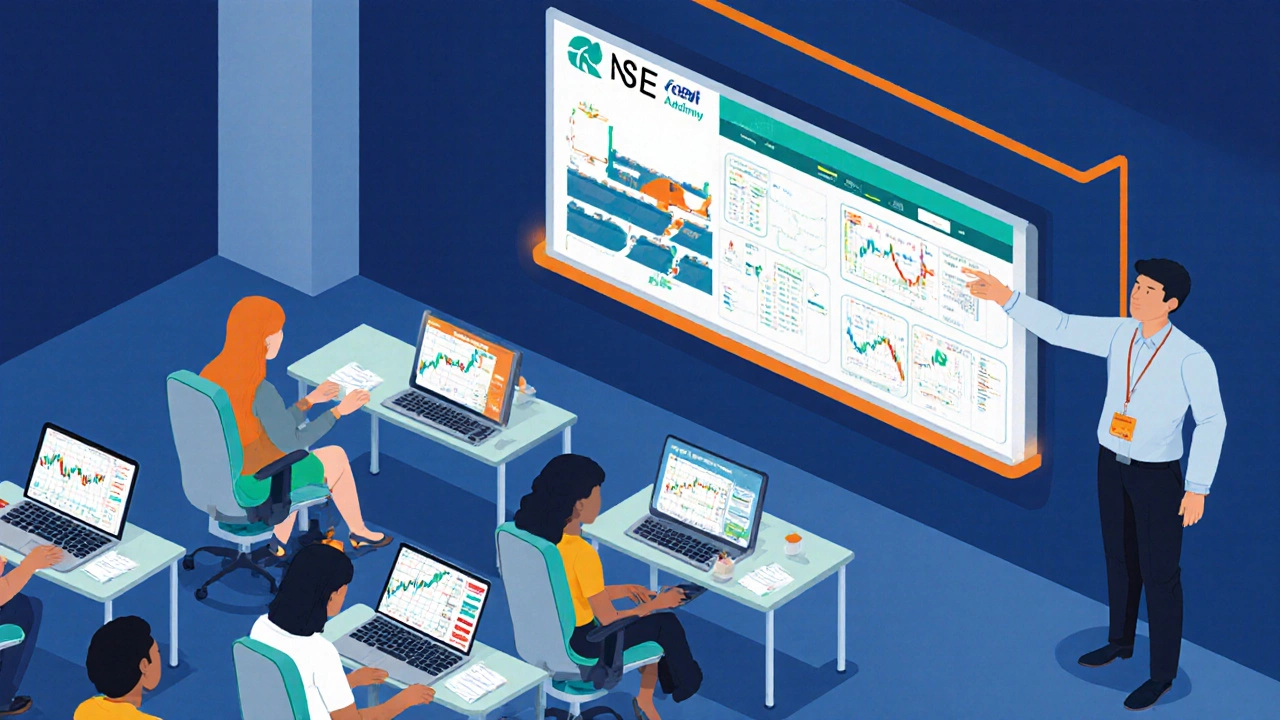Where to Learn Trading in India? - Best Courses & Institutes 2025

Trading Course Comparison Tool
Filter Trading Courses
Top Trading Courses in India (2025)
| Institute | Course Type | Duration | Fees (₹) | Certification | Mode | Features |
|---|---|---|---|---|---|---|
| NSE Academy | Equity, Derivatives | 30-90 days | ₹15,000 | SEBI-recognized | Online & Classroom | Practical simulations 30% more earn |
| BSE Institute | Equity, Futures | 45 days | ₹12,000 | Industry-acknowledged | Hybrid | 1-year mentorship Live trading floor |
| Angel One Academy | Options, Technical | 6 weeks | ₹15,000 | Broker-linked | Online live | Immediate platform access Options strategies |
| ICICI Direct Learning | Fundamentals, Research | 3 weeks | ₹9,500 | Corporate-accepted | Online recorded | Financial research focus Shorter duration |
| StockEdge Academy | Quant, Algo | 8 weeks | ₹18,000 | Skill-based badge | Online interactive | Python coding labs Job-ready portfolio |
This comparison shows the top 5 trading courses in India. Filter by your specific needs to find the best option for your goals and budget.
India’s stock market has exploded over the past decade, and the demand for skilled traders has surged alongside it. If you’re scrolling through endless ads and wondering where to start, you’ve landed in the right spot. Below is a practical guide that cuts through the hype and shows you exactly where to learn trading in India, what to look for, and how to turn a course into a real‑world edge.
What Makes a Good Trading Course?
Before we name any institute, it helps to know the criteria that separate a useful program from a flashy marketing gimmick. Look for these five pillars:
- Curriculum depth: Does it cover basics, technical analysis, fundamentals, risk management, and actual market simulations?
- Instructor credibility: Are the teachers active traders or certified professionals?
- Certification value: Is the certificate recognized by industry bodies like the Securities and Exchange Board of India (SEBI) or major brokerage houses?
- Mode of delivery: Online live sessions, recorded modules, classroom workshops, or a hybrid?
- Post‑course support: Access to trading rooms, mentorship, or alumni networks?
When you score each course against these factors, the choice becomes a lot clearer.
Top 5 Trading Institutes in India (2025)
Here’s the shortlist of institutes that consistently rank high on the above pillars. Each entry includes a brief overview, key stats, and a link to the official portal (links omitted per instruction).
NSE Academy - The educational arm of the National Stock Exchange offers a structured syllabus ranging from "Introduction to Stock Markets" to "Advanced Derivatives". Courses run for 30‑90 days, with fees between ₹8,000‑₹25,000. Certification is widely accepted by brokerage firms.
BSE Institute - Backed by the Bombay Stock Exchange, this institute focuses on practical trading floors and live market simulations. Its flagship "Equity Trading Mastery" runs for 45 days, priced at ₹12,000, and includes a one‑year mentorship.
Angel One Academy - Part of the Angel One brokerage, the academy delivers a blend of technical analysis and options strategies. The "Options Pro" program is a 6‑week, ₹15,000 course that grants immediate access to Angel’s trading platform for practice.
ICICI Direct Learning - Known for its strong financial research wing, ICICI Direct runs short‑term modules like "Fundamentals of Equity Research" (3 weeks, ₹9,500). The certificate carries weight in corporate finance and equity research circles.
StockEdge Academy - A newer entrant, StockEdge focuses on data‑driven trading. Its "Quantitative Trading Bootcamp" (8 weeks, ₹18,000) includes Python coding labs, back‑testing tools, and a job‑ready portfolio.
Comparison Table
| Institute | Course Type | Duration | Fees (₹) | Certification | Mode |
|---|---|---|---|---|---|
| NSE Academy | Equity, Derivatives | 30‑90 days | 8,000‑25,000 | SEBI‑recognized | Online & Classroom |
| BSE Institute | Equity, Futures | 45 days | 12,000 | Industry‑acknowledged | Hybrid |
| Angel One Academy | Options, Technical | 6 weeks | 15,000 | Broker‑linked | Online live |
| ICICI Direct Learning | Fundamentals, Research | 3 weeks | 9,500 | Corporate‑accepted | Online recorded |
| StockEdge Academy | Quant, Algo | 8 weeks | 18,000 | Skill‑based badge | Online interactive |

Online Platforms vs. Classroom Training
Both formats have their champions. Online courses, especially after the pandemic, offer flexibility, lower costs, and the ability to replay lectures. They’re perfect if you juggle a full‑time job. Classroom sessions, however, give you instant feedback, networking with peers, and often access to live trading floors-a priceless experience for hands‑on learners.
Ask yourself: Do you thrive on self‑discipline or do you need a structured environment? Your answer will tilt the scale.
How to Pick the Right Course for Your Goals
- Define your trading style. Day‑trading requires fast‑execution tools and deep technical analysis, while swing‑trading leans on fundamentals and market sentiment.
- Check the instructor’s track record. Look for verifiable performance stats or testimonials from verified traders.
- Match the course length to your timeline. If you want a quick start, a 3‑week fundamentals module works; for a career switch, aim for a 2‑month comprehensive program.
- Verify certification credibility. Courses endorsed by SEBI or major exchanges carry more weight with employers.
- Consider post‑course support. Mentorship, alumni groups, or access to a live trading room can accelerate your learning curve.
Following these steps narrows the field from dozens to the few that truly match your ambition.
Certification, Careers, and Earning Potential
A valid certificate opens doors to roles such as:
- Equity Research Analyst
- Proprietary Trader
- Portfolio Manager Assistant
- Financial Advisor (with additional licensing)
According to a 2024 industry survey, traders with SEBI‑recognized certifications earn on average 30% more than self‑taught peers. Moreover, many brokerage firms run campus hiring drives for graduates of NSE Academy and BSE Institute.

Common Pitfalls and How to Avoid Them
Even the best course can’t save you from a few classic mistakes:
- Skipping practice. Theory without live market simulation leads to a false sense of confidence. Choose a program that includes a demo‑trading account.
- Over‑relying on tips. Many courses sell "secret strategies" that rarely work in volatile markets. Focus on fundamentals and risk management.
- Ignoring regulation. Trading without understanding SEBI’s rules can land you in legal trouble. A good institute covers compliance basics.
- Neglecting psychology. Emotional discipline separates winners from losers. Look for modules on trader mindset.
Address these early and you’ll shorten the learning curve dramatically.
Quick Checklist - Is This the Right Trading Course for You?
- Curriculum covers basics, technical & fundamental analysis, risk management.
- Instructors are active traders with proven track records.
- Certificate is SEBI‑recognised or accepted by major brokers.
- Offers live market simulations or demo accounts.
- Provides post‑course mentorship or alumni network.
If you can tick most of these boxes, you’re on the right track.
Frequently Asked Questions
Are online trading courses as effective as classroom ones?
Effectiveness depends on your learning style. Online courses offer flexibility and often lower fees, while classroom sessions provide immediate feedback and networking. Choose what fits your schedule and discipline level.
Do I need a SEBI‑approved certificate to trade legally?
You can trade without a SEBI certificate, but having one boosts credibility with brokers and employers, and it ensures you’ve covered essential compliance topics.
How long does it take to become a competent trader?
Most intensive programs last 2‑3 months, but true competence comes from consistent practice. Expect 6‑12 months of active trading after completing a course.
Can I get a job with a trading certificate?
Yes. Brokerage firms, research houses, and financial consultancies often hire candidates who hold SEBI‑recognised or exchange‑affiliated certificates, especially when combined with internships.
What is the average cost of a good trading course in India?
Quality programs range from ₹8,000 for short introductory modules to ₹25,000 for comprehensive, multimodule tracks. Most reputable institutes fall between ₹10,000‑₹18,000.
Ready to start? Pick the institute that aligns with your goals, enroll, and begin trading with confidence. The market rewards knowledge-and now you know exactly where to get it.

Post-Comment